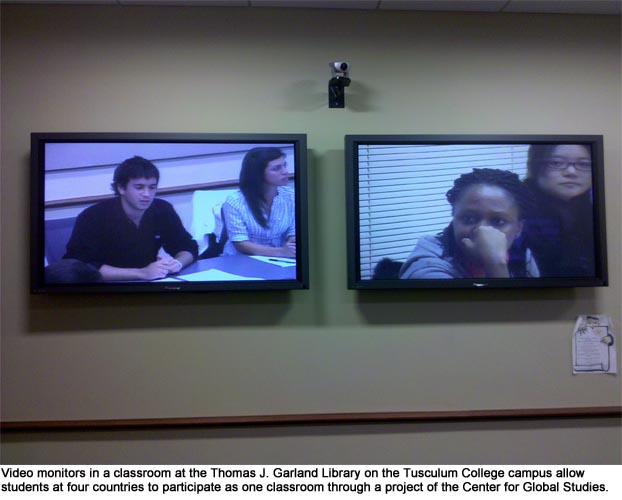A new program developed by the Tusculum College Center for Global Studies has resulted in the creation of a global classroom for discussing global business issues with other college students from around the world.
“The new program is based on the technology that Tusculum College has invested in that allows us to link up to classrooms across the globe for one coordinated classroom discussion,” said Dr. Geir Bergvin, director of the Center for Global Studies and associate professor of marketing at Tusculum College.
Along with Tusculum’s technology, a partnership with the Greeneville City Schools that allows for other universities across the world to link with Tusculum has provided a unique opportunity on campus to participate in worldwide interactive discussions and other shared classroom activities, according to B.J. Roberts, instructional technology specialist at the College.
“To begin the program we have coordinated with the college’s Business Club, the Study Abroad and Global Awareness organization, as well as other interested students,” said Bergvin. Also working with the students in a mentoring capacity is Dr. Tom McFarland, director of the college’s School of Business, associate professor of business administration and advisor for the Business Club.
In the first session, the connection was made to HIH University in Harstad, Norway, and included students from that university who were studying abroad from several countries, including Ghana, France, Germany and China. Students from Tusculum College also included study abroad students from Chile and Venezuela.
During the second session, held on Monday, December 6, the videoconference classroom was expanded further, with four classrooms connecting: Tusculum College, with 10 students participating; Norway, with 11 students participating; Russia with 12 students participating and Ghana with 10 students participating.
The second session focused on the role of energy in the global environment, with students led by faculty moderators at each site. The four groups held an open dialogue regarding issues such as standardization of environmental policies and laws, as well as the economic drivers that affect the economic policies of individual countries.
According to Bergvin, each group of students was able to speak and interact as part of a group discussion based on previous work and an international dialogue was able to occur. The class, despite the varied locations, operated like a discussion group in a regular classroom setting.
“This has been a good first step,” said Bergvin, who hopes to continue the video conference discussions, as well as expand the program to use for other classroom and community purposes.
“Being in the United States, I have seen how much easier it is to have a global viewpoint,” said Luis Zamora, a Tusculum College sophomore international student majoring in management and economics. Zamora was born in Germany and later moved to Chile. “Being a multicultural country helps with global competencies.”
Added McFarland, “For all of us who participated, it has been an exercise in becoming more globally competent, and we want to continue to advance the understanding of the world’s cultures and encourage more active dialogues like we have had here.”
Several more sessions are planned for the spring semester, and as the program develops, Bergvin and McFarland said they would like to be able to expand the number of students who are able to participate.
Anyone interested in more information on the program or who would like to find out about Tusculum College’s Center for Global Studies should contact Bergvin at 423-636-7300.



